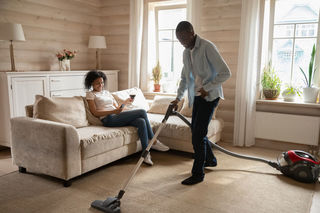Sex
Barriers to a Better Sex Life When One Partner Has ADHD
What does research tell us about what gets in the way of a better sex life?
Posted October 22, 2019 Reviewed by Ekua Hagan
Most people want a good sex life, so what gets in the way? And wouldn’t most couples be happier if they had more sex (good sex, obviously)?
To try to shed light on what it would take to make things better for couples when one partner has ADHD, I created an online survey looking at sexual and relationship satisfaction, which I wrote into my newest book, ADHD After Dark. Three thousand folks responded, so others also seem to be interested in this. Out of the 72 questions, 25 of them listed potential barriers to a better sex life that respondents could rate from "not a barrier" to an "extreme barrier."
There are some good lessons in this data for all of us—especially if you or your partner have ADHD, but even if neither of you does. ADHD doesn’t really create new relationship problems; it merely exacerbates the universal struggles that every couple needs to find a way to manage. As in, negotiating different preferences and ways of doing things, balancing work and play, and deciding what to try to change versus what to accept.
Let’s take a look at the smallest and then the biggest barriers, so we know where to put our energy. You may find that some of these apply to your relationship more than others do—and that your partner may rank those barriers differently. Ideally, the two of you would discuss them and then brainstorm how to overcome them. My hope is that having a conversation about each of these potential barriers can help you pinpoint what is having the biggest impact on your relationship.

When analyzing respondents’ data, I broke it out by ADHD status and gender, so there were four types of romantic partners: men with ADHD, men without ADHD, women with ADHD, and women without ADHD. Since these were heterosexual couples, this made for two types of couples: men with ADHD plus a woman without ADHD, and women with ADHD plus a man without ADHD. There were differences between these four types of respondents in terms of what they saw as the biggest barriers, but also some similarities.
The Good News: The Smallest Barriers
I think we can all be heartened about the barriers that were rated the least problematic:
- I don’t feel that the sex will be satisfying, so I don’t even bother.
- I am disinterested in sex in general, not just with this partner.
- I am no longer sexually attracted to my partner.
- My partner asks too much of me sexually.
- I don’t understand my partner’s sexual needs or can’t please him/her sexually.
Basically, what this says is that people felt that sex was good when they had it. The trick is making it happen. Having said that, if there is something specific about the sex you are having that is interfering with having a better sex life, then obviously do something about it.
The Points of Intervention: The Biggest Barriers
When I looked at the top 5 barriers for each of the 4 kinds of respondents, the 10 total barriers generally sorted out into 2 themes: too little time or energy for sex and too many bad feelings.
Too little time or energy for sex:
- One or both of us are too busy with other things to have time for sex.
- It can be difficult to switch gears from other demands and be sexual.
- I am too tired to have sex.
- There would be more time for sex if time was used more efficiently.
Too many bad feelings for sex:
- My partner acts disinterested in having sex with me, even when I ask.
- I’m too angry with my partner to want sex.
- My partner is too angry with me for us to have sex.
- My partner seems like another child, lessening his or her appeal.
- I resent that my partner doesn’t pay enough attention to me unless he/she wants sex.
- I feel uncomfortable sharing my sexual desires with my partner.

It’s easy to see how the frustrations related to not having enough time, particularly if someone feels that there is a significant workload imbalance, can drive bad feelings. But it can also go back around the other way if the couple feels disconnected emotionally and sexually and therefore isn’t working well as a team on the mundane matters of daily life.
Good sex can help partners feel better about each other, which can make them more generous in nonsexual matters—which probably has the benefit of increasing sexual generosity. So, if you feel like you and your partner are stuck in a negative momentum loop, then make a point of putting in the effort to turn that around. You may need to start with generosity in nonsexual areas, but you also can’t wait for everything to be perfect in the relationship before having sex again, because you are then missing out on the relationship-enhancing benefits of good sex.
It should be noted that some sexual barriers probably mostly reflect an inherent quality of the individual, regardless of who they are in a relationship with—for example, if someone has trouble mentally switching gears for sex, that was probably true for them in most of their relationships. However, some sexual barriers may be more reflective of the interaction between the partners, at least at that point in time—for example, being too angry at one’s partner to want sex.
However, there is always an interaction between partners, even if one partner brings a strong tendency to the relationship. The challenge for all couples is to find ways to reduce these barriers so that they get the benefits of good sexual experiences on their ability to work together as a team on the rest of what life throws at them.
References
Tuckman, A. (2019). ADHD After Dark: Better Sex Life, Better Relationship. NY: Routledge.




